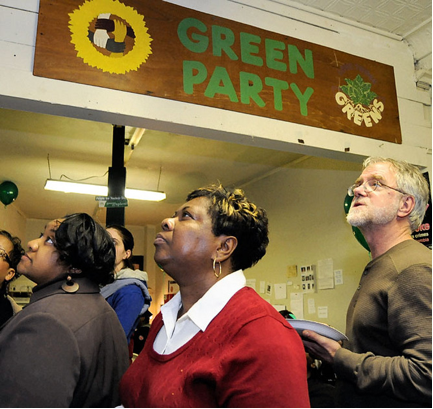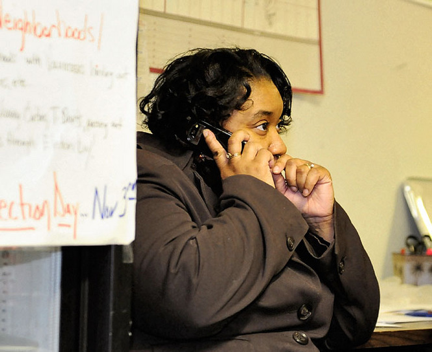
A Little Disappointed, Not Discouraged At All
by Howie Hawkins
Thank you to all the volunteers and contributors to my campaign. You are Greens, Socialists, independents, some die-hard progressive Republicans, and a growing “Democratic Underground” in the district supporting the Green policy agenda.
41 percent is a higher vote than a Green candidate has ever received in Syracuse. We've never done the kind of doorstep and phone canvassing, voter ID, and GOTV that we did this time. Our street presence on Election Day surpassed every other campaign in the city.
From what I've seen of the Campaign Finance Reports posted at the state Board of Election, our broad base of small individual contributors far surpassed that of any other campaign in the city. We raised more money that way than any other district council candidate, unless they spent a lot more in the last 10 days that has not yet been reported.
The major party candidates relied on a small number of big contributions from wealthy individuals and the PACs of landlords, developers, and other business interests, and, unfortunately, the unions. About the only evidence my opponent had a campaign was two mailers to voters sent on his behalf from 1199 SEIU in the last five days.
The unions continue to naively believe they can buy friends for workers in the parties of big business, whose campaign contributions dwarf labor’s. Memo to the unions from a rank-and-file Teamster: The bosses have two parties. We need one of our own.
I am only a little disappointed that we did not win the office this time. We needed to bring about 10 percent more of the voters off the Democratic line at the top and down to the bottom line to vote Green. In the end we were beaten by the “Zombie Democrats” who vote their brand loyalty without knowing who the candidates are. They would vote for George W. Bush and Dick Cheney if they were on the Democratic line as they automatically click every lever across the Democratic row on the machines.
But I am encouraged about the future. The platform on which we campaigned—living wages, community hiring hall, public power, municipal broadband, municipal development bank, sustainability plan, progressive tax reform, full funding for schools and youth programs—is popular with the voters we were able to reach. The 41 percent vote gives us a stronger voice to push for these reforms between now and the next election, when the Greens will be back to challenge the corporate rulers’ two-party duopoly again.
Photos from Green Party Headquarters on Election Night
Syracuse Post-Standard
November 3, 2009

Photo by Katelyn Anthony
Kim Rohadfox-Ceaser (L), Geraldine Perry (C) and Howie Hawkins (R) watch the election results. Rohadfox-Ceaser is an incumbent for the Syracuse School Board. Perry worked as the campaign manager for Hawkins.

Photo by Katelyn Anthony
Kim Rohadfox-Ceaser, an incumbent for the Syracuse School Board, awaits the results of the elections. Kim Rohadfox-Ceaser was an incumbent Democratic member of the Commission of Education. She was not designated by the Democrats for re-election. She was on the ballot as a Working Families Party candidate and endorsed by the Green Party.
Why I Committed Civil Disobedience for Health Care Reform
One day after being defeated 59% to 41% , Howie participated in a peaceful demonstration at the offices Wellpoint/Excellus, protesting the companies
health care policies. He ended up spending the night in jail,
then appearing in the court the next day in shackles.
Post Standard Endores Hawkins
Get-Out-The-Vote Volunteering & Election Night Partying
Howie Hawkins for 4th District Councilor
Syracuse, New York
A Community Activist for the 4th District
Vote on November 3, 2009
View Sample Ballot | 4th District Map
COMMUNITY SERVICE:
- Prompt Response to Constituent Calls
- Regular Hours at the South Salina Street Office
- Neighborhood AssembliesóRegular Meetings to Discuss Issues and Organize to Realize Community Goals
- Fully Funded Public Schools
- Crime Prevention through Youth Jobs & Recreation
- A Stronger Living Wage Law
- A Community Hiring Hall to Increase Jobs for Inner City Residents
- A Municipal Bank to Create Community-Owned Businesses
- Neighborhood Grocery Stores
- Municipal Broadband (Cable TV, Internet, Phone) for More Channels and Better Technology at Lower Rates
- Public Power for Affordable, Green Energy
THE 4TH DISTRICT
The 4th Council District in Syracuse encompasses Downtown, University Hill, the near East Side, and the South Side. It has high concentrations of poverty and unemployment on the Southside right next to the biggest employers with some of the best jobs in the Central New York at the “eds and meds” (Syracuse University, SUNY ESF, and the hospitals on University Hill). These institutions are the drivers of the region’s economy and most of the 40,000 people who commute into Syracuse work on the Hill.
Meanwhile, the US Census in 2005 reported that Syracuse had the 3rd highest poverty rate – and the highest black poverty rate – of the central cities of the 100 largest US metropolitan areas.
It’s time to put the wealth of the 4th District to work for all of the people of the 4th District. Jobs that pay living wages are the best anti-poverty program. Not only do living wage jobs provide enough income to meet basic expenses, they stabilize families and neighborhoods and thus reduce crime, violence, and all the negative things that are now flowing from the streets into the schools to disrupt learning.
LIVING WAGE JOBS TO END POVERTY
Jobs at Living Wages is the number one priority. We need a City Minimum Wage that is Living Wage so that all workers in the city can meet their basic expenses. This stronger Living Wage Ordinance should include a Community Hiring Hall where inner city residents can qualify, get into, and stay in training programs and jobs with the city, its contractors, and other employers. The Community Hiring Hall should be part of a coordinated Green Jobs program to train and recruit city residents for the skilled workforce of the new Green Economy. We should also prioritize funding for Youth Jobs and Recreation. The schools and parks should be open and staffed nights, weekends, and summers.
COMMUNITY ENTERPRISE
We also need to Create New Jobs. Creating community-owned enterprises that profit the whole community instead of absentee-owned corporations is the best way to create new jobs that are anchored to our community by their ownership structure. We need a Municipal Development Bank to help plan, finance, develop, and advise new community enterprises, particularly worker and consumer co-ops and resident owner-operator businesses. A high priority for the Municipal Development Bank should be the development of a network of Neighborhood Co-op Grocery Stores downtown and in the neighborhoods, none of which have groceries. We must continue the push for Public Power, a city-owned power utility to cut energy costs and build renewable green energy sources. With the Time-Warner franchise up for renewal, now is the time for Municipal Broadband (Cable TV, Internet, Phone). Customers pay an average of 30% less in municipal broadband systems for better services. Development should raise up existing residents, not price people out of their neighborhoods. We need to protect existing residents through Inclusionary Zoning and Community Benefit Agreements that require developers to build affordable housing and through Community Land Trusts that enable neighborhoods as a whole to benefit from rising land values.
A GREEN ECONOMY for a SUSTAINABLE SYRACUSE
Everybody is a “green” now. Every politician and every party in Syracuse now pays homage to “sustainable development” and a “green economy.” More people than ever now recognize that between catastrophic climate change and the peaking of oil production, we can no longer take our supplies of food and energy for granted. The Green Party welcomes this development. But there is more to greening Syracuse than renewable energy and green buildings. The key to a Sustainable Syracuse is building the political and economic democracy that gives us the power to build sustainability despite the power of the vested interests that profit from the unsustainable status quo. To exercise this democratic planning power, we need neighborhood-based planning by Neighborhood Assemblies in each of the city's real neighborhoods where residents can debate, decide, and instruct representatives on the citywide Comprehensive Plan and their own Neighborhood Plans. We also need City Planning Department, not to make planning decisions, but to provide expert consultation to city officials and the democratic planning process based in the Neighborhood Assemblies.
FAIR TAXES TO FUND THE CITY, SCHOOLS, & YOUTH PROGRAMS
The poorest 20% pay 14% of their income in sales and property taxes while the wealthiest 20% pay only 7% in New York State (Fiscal Policy Institute, 2003). Meanwhile, the city of Syracuse faces a recurring $25 million annual structural deficit. We need a more progressive local tax structure to make taxes fair and sufficient to fund city services, schools, and youth programs. We must Fully Fund Public Schools by reforming the state funding formula and committing to a regular annual increase in the city contribution to the school budget. We should establish a progressively graduated City Income and Commuter Tax, including a tax on the incomes earned in the city by 40,000+ commuters. Commuters use city services (police, fire, roads, infrastructure) but make no contribution to pay for them. We should create Progressive Property Taxes through Land Value Taxation: cut the property tax, make it progressive, and stimulate inner-city development by taxing land values more and improvements to homes and businesses less.
NEIGHBORHOOD ASSEMBLIES and FAIR ELECTIONS
We should create Neighborhood Assemblies in the 25 or so real city neighborhoods where each resident has a voice and vote on neighborhood and citywide planning, budgeting, and policymaking. We also need fair elections. We should institute Instant Runoff Voting for single seats like Mayor and District Council. We should have Proportional Representation on Common Council so every party gets representation in proportion to their support among the voters. And we need Public Campaign Financing. City elections should not be for sale.

